A Certain Amount of Suffering: On the Women of True Detective
by Susan Elizabeth Shepard and Anne Helen Petersen
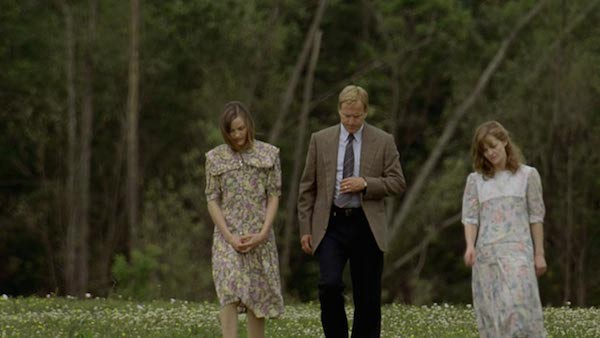
Something happened last week in the True Detective response ether: up to this point, online discussion had mostly rotated around the McConnaissance, the aesthetics, or the thickening mythology. But we woke up last Monday to a slew of pieces on the treatment of women on the show — see Grantland’s Molly Lambert, Slate’s Willa Paskin, and The New Yorker’s Emily Nussbaum, all grappling with the same overarching question: the women on this show are treated like shit. But what does that mean?
AHP: For me, this comes down to a tension I see pulsing through a lot of contemporary media: when you present a misogynist environment, are you fetishizing it or critiquing it? I always think of The Girl with the Dragon Tattoo here — in the books, Stieg Larsson paints a world of incredible violence, physical and cultural, against women, but his goal, as a feminist writer, is to implicitly critique that world. The Swedish title of the original book was Men Who Hate Women, and the narrative was intended to manifest the extent of evil that extends, in all directions, from the viewpoint. The movies, however — especially the American ones — neglected the critique in favor of Fincher-style aestheticism, effectively evacuating the politics.
So what’s happening with True Detective? Is the narrative so beautiful that we forget that its in service of the exploitation of women’s bodies? Or is the dystopia itself a polemic against misogyny? Put differently, do the ends justify the means?
SES: Mainly, it’s that McConaughey’s knife-edge cheekbones are so beautiful that I’m just now emerging from the stupor they put me into. (AHP: Preach.) When Marty flew into his rage at Lisa’s apartment was when I started to pull back. If you’re going to make a dead sex worker the inciting incident for your story, if one of the central characters is defined by his rage about the sexual purity of the women in his life, it needs to pay off in the form of story advancement and character development, otherwise it’s just gratuitous, sensational, “edgy.” And for the last several episodes, it’s become clear that the only satisfying way for the mystery to end is for Rust or Marty to be the killer. But we’re gonna get some dumb conspiracy of Louisiana good ol’ boys who worship the devil, which is going to be unsatisfying and also not give the proper payoff to all that violence against women, which then becomes just so many witchy antler decorations with no clear meaning.
So, are we getting that payoff? If Marty’s rage about the sex lives of 1) his mistress 2) his daughter and 3) his wife change him, we do.
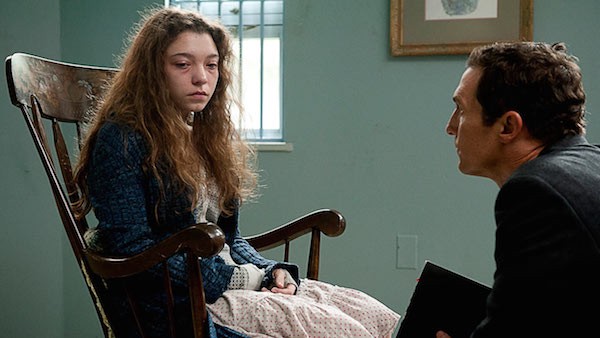
AHP: I just watched the penultimate episode and I don’t know what to do with Marty now that we’re so thoroughly in the present. He’s seemingly reformed (he drinks green tea; he’s stopped hound-dogging) but it’s also clear that he’s completely shirked his responsibility as a father and the only reason he’s not exploiting women is because he’s too old to get play (thus: desperate Match.com-ing). Plus he resisted Rust for all of ten minutes: sitting in his crappy apartment, eating microwave dinners, doing PI work, he’s totally impotent, and Rust offers him a way to return to his dick-swinging days of yore. His visceral reaction to the videotape is meant to remind us that he’s a guy who can’t bear violence against women — but do we also remember his own violence against women? For me, it’s a question of narrative amnesia: when the series is done, how will we understand Rust and Marty? If, as you (I think properly) predict, it’s a bunch of evil cultish white dudes, won’t that provide Marty, Rust, and all of us with too clean of a catharsis?
SES: Yes, and a total copout. I need one of them to be the killer, so bad, and I need it to be Marty, because of of mental illness or supernatural causes or because he’s been drugged by the evil ring of church men. But I’m right with you, the present Marty having to reap what he sowed does pay off some of his behavior. It’s not just that Marty’s sadly clicking on Match.com while eating microwave dinners, it’s that Maggie’s in a nicer, bigger house and that the girls are off living their adult lives while not speaking to him for months at a stretch. They’re better off and he’s worse off (statistically not usually the case for women and children after a divorce, also, maybe there’s going to be some crazy twist in the form of who Maggie took as a second husband). But he’s still the same raging dude, as shown by his immediate reversion to avenger of innocents.
AHP: Marty’s paradigm/ worldview doesn’t change just because he’s 15 years older — and, in line with Rust’s declaration that “time is a flat circle,” I do appreciate the way the show refuses our characters any sort of growth because, in real life, most people don’t grow out of their ideologies; if anything, they become more entrenched in them. Any text (HI CRASH) that suggests that people lose their racism/ classism/ sexism /homophobia over the course of a single season, let alone an episode, is blinding its audience to the way that systems of oppression actually work. In other words: it takes A WHOLE LOT to change people’s understanding of the world, and the ease with which Marty slips back into his innocent-avenger role reminds that even church, sobriety, divorce, and the disintegration of his career can’t change that.
One of the main complaints about the show concerns its lack of fully developed characters. What do we do with that?
SES: I am less concerned with an overall lack of female characters of any depth, maybe because it’s a bro detective show and so I’m just not expecting that much of the supporting characters to begin with. Nobody else in the show really gets fleshed out; should we be expecting anything else for the women?
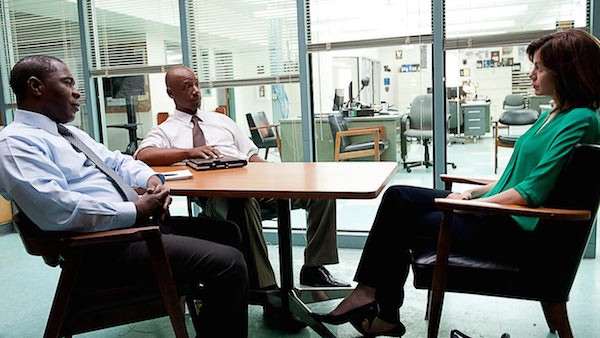
AHP: Any woman in America has been trained to find points of identification in bro genres. I’m not making an excuse for TD so much as stating that it’s but one of dozens of programs, many of them “quality” texts, without fleshed out female characters. I find myself identifying with Rust’s intense cerebralism and asocialness (WHAT DOES THAT SAY ABOUT ME?) (SES: Probably that you are a writer), but I also find Marty’s daughters fascinating.
Granted, all of our female characters are foils for our protagonists’ development, but I do think that we’re meant to read this patriarchal world as broken. In last week’s Grantland’s Hollywood Prospectus podcast, Andy Greenwald decried those who argue that a flaw on a show (such as Girls’ lack of diversity, of True Detective’s dude-focus) is “on purpose,” thereby immunizing the narrative from critique. I think we should always draw attention to the lack of representation, but I also think that a show’s lack of diversity can function as its own critique. The whiteness of Girls is just one component of its postfeminist dystopia; the dead women of True Detective are the logical extension of Marty’s internalized misogyny. But again, the season finale has the potential to put that reading to bed.
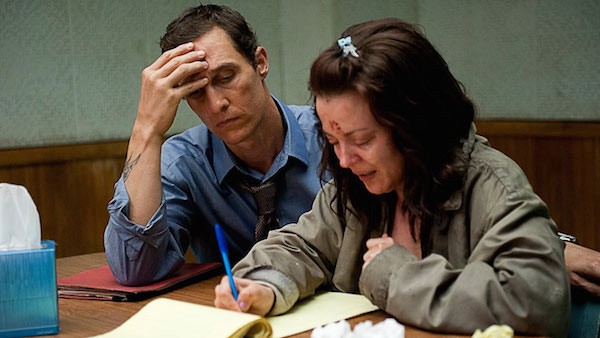
SES: I agree with you and am of the opinion that we can talk about these problems of representation and still enjoy entertainments without having to rationalize their problems. And I am probably bothered more than anything by the fact that a murdered truck stop prostitute is a lazy-ass inciting incident — why couldn’t she have been a waitress, for the love of god.
I do not think that a narrative is immunized from critique because some troublesome aspect of it also happens to be crucial to its development. Who thinks you stop a conversation that way, anyway? You can have purposeful and systematic harm done to women and have it advance your story and characters and still talk about it being ugly. It’s ugly in the actual world and any story worth a damn will get you to thinking about that eventually.
Or maybe only women think that, and men are able to see it as so much aesthetics and storytelling, which is a distinct and bleak possibility, and I suppose that’s the most depressing conclusion I could come to; that it’s maybe too close to a reality where a certain amount of suffering is a tangible reality for women and an abstract concept to occasion shows of bravado for men.
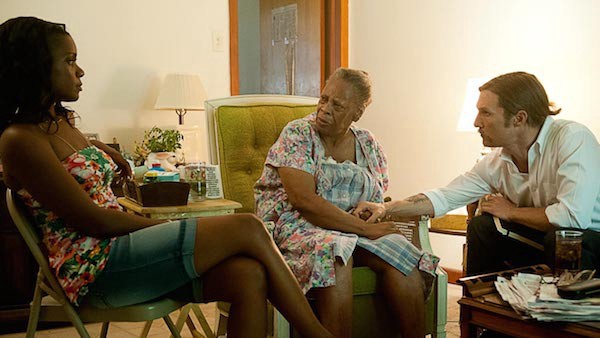
AHP: The amount that last paragraph makes sense to me is terrifying — especially since it effectively renders the ending inconsequential. Feminist scholars examining the history of film have suggested that for women, watching movies is a continual process of masochism — of willfully identifying with and experiencing suffering. By contrast, cinema forces (straight) men to identify with the sadistic pleasures of punishment and revenge. For various reasons, mainstream television has always functioned somewhat differently — the male gaze is more diffuse, for one, but so are the narratives themselves and the way we consume them. But I fear that the rise of “filmic” television, for all of its addictive qualities, doesn’t also reproduce the same schemas of those who cause and those who feel suffering.
SES: As I fantasized about satisfying endings for the season, I thought that watching the young girl who was rescued from the meth lab kill some guys would be solid. There’s a reason that BAM put together a whole festival of female revenge films: it feels good to identify with the avenger, and women shouldn’t be denied that or have to enjoy it through a male proxy. But to quote Rust, “I’d consider myself a realist, but in philosophical terms I’m what’s called a pessimist,” so I’m not holding my breath.
Susan Elizabeth Shepard has two jobs and lives in Austin, TX.
Anne Helen Petersen is a Doctor of Celebrity Gossip. No, really. You can find evidence (and other writings) here, and you can read the Scandals of Classic Hollywood series here.